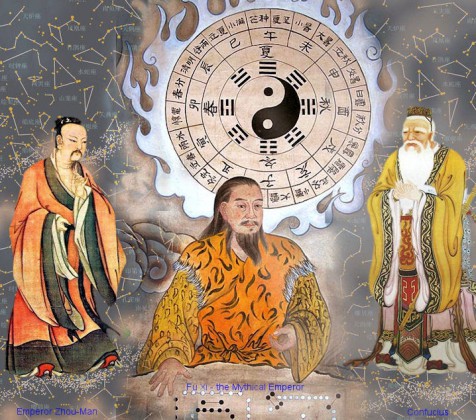I Ching and ancient chinese archetypes
Basically two are the cultural addresses of China, Confucianism and Taoism, the way of fairness and the way of spontaneity. The revelation of these two social and philosophical aspects is the Book of Changes, that is, I-Ching, one of the oldest philosofical texts of humanity. There are several comments from Confucius and Lao Tze, as well as more recent Chan math considerations (Buddhist Meditation). The I-Ching are also the basic psychic archetypes of the Chinese zodiac and the two aspects of Yin and Yang, the Feminine and Masculine, Darkness and Light, Earth and Heaven.
The spontaneous and natural interaction of opposites, in continuous motion, described in I-Ching, is the same as the Greek "Panta rei os potamòs" ('Everything flows like a river'), the famous aphorism attributed to Heraclitus, contemporary of Lao Tze. But even in the Solomon's Book of Proverbs, the Christening of Heaven with the Earth, the conjunction of opposites ... the serpent who bites the tail ... is mentioned as a miracle of the polarities that integrate, the two who are one , the sweetness of a woman's heart that makes it quiet the aggressiveness of man ...
This is the intelligence that drives umanity in what we now call 'evolution', as Leo Tolstoy said: "If a man wants to help the world, he does not have to think about fleeing the world. He has to learn to know it and to live in it, becoming an oasis, a refuge for those who are looking for their own soul. " And it is just finding the true correctness of acting in the world. With the help of the fundamental principles of the Book of Changes (I Ching) it is possible to realize the fullest man's faculties in the most complete way. This possibility is based on the fact that man has faculties similar to Heaven and Earth, since he is a micro-cosmos.
Since the laws of Heaven and Earth have been reproduced in the Book of Changes, it provides the tools to cultivate its intrinsic nature so that the most intimate good qualities can unfold. In particular, two things are taken into account: wisdom and work, intellect and will. When intellect and will are centered in the right way, emotional life comes to the right harmony.
By analogy I like to remember the legendary events and episodes of the life of the great Taoist master, Zhuang Zi, who lived in the 3rd century BC., and is author of the "Southern Flower Book". An example of noble behavior that quails perfectly with Richard Wilhelm's commentary on the sixth line of the exagram Lin, which describes the attitude of the sage that has already surpassed the world and which has no connection with mundane existence, but sometimes it may be in the situation of having to go back into society again, to get closer to others and to provide its help. This is of great health to his neighbor, but for him this magnanimous humiliation is not a stain.
Paolo D'Arpini
The spontaneous and natural interaction of opposites, in continuous motion, described in I-Ching, is the same as the Greek "Panta rei os potamòs" ('Everything flows like a river'), the famous aphorism attributed to Heraclitus, contemporary of Lao Tze. But even in the Solomon's Book of Proverbs, the Christening of Heaven with the Earth, the conjunction of opposites ... the serpent who bites the tail ... is mentioned as a miracle of the polarities that integrate, the two who are one , the sweetness of a woman's heart that makes it quiet the aggressiveness of man ...
This is the intelligence that drives umanity in what we now call 'evolution', as Leo Tolstoy said: "If a man wants to help the world, he does not have to think about fleeing the world. He has to learn to know it and to live in it, becoming an oasis, a refuge for those who are looking for their own soul. " And it is just finding the true correctness of acting in the world. With the help of the fundamental principles of the Book of Changes (I Ching) it is possible to realize the fullest man's faculties in the most complete way. This possibility is based on the fact that man has faculties similar to Heaven and Earth, since he is a micro-cosmos.
Since the laws of Heaven and Earth have been reproduced in the Book of Changes, it provides the tools to cultivate its intrinsic nature so that the most intimate good qualities can unfold. In particular, two things are taken into account: wisdom and work, intellect and will. When intellect and will are centered in the right way, emotional life comes to the right harmony.
By analogy I like to remember the legendary events and episodes of the life of the great Taoist master, Zhuang Zi, who lived in the 3rd century BC., and is author of the "Southern Flower Book". An example of noble behavior that quails perfectly with Richard Wilhelm's commentary on the sixth line of the exagram Lin, which describes the attitude of the sage that has already surpassed the world and which has no connection with mundane existence, but sometimes it may be in the situation of having to go back into society again, to get closer to others and to provide its help. This is of great health to his neighbor, but for him this magnanimous humiliation is not a stain.
Paolo D'Arpini



